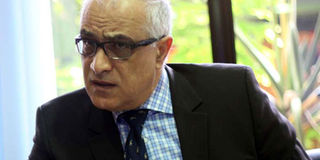Relief as hospital buys hi-tech cancer machine

Aga Khan University Hospital chief executive officer Shawn Bolouki speaks during an interview at the hospital on December 10, 2015. The hospital has announced the acquisition of a Positron Emission Tomography (PET) CT scanner and Cyclotron. PHOTO | NATION MEDIA GROUP
What you need to know:
- Kenyans are spending Sh8 billion annually to seek treatment for cancer abroad.
- The use of the machine is one way of tracing cancer and learning its stage.
Kenyan patients will soon have access to hi-technology cancer screening services locally after one of the country’s private hospitals acquired a machine capable of detecting the disease and specifying its stage.
In what is panning out to be a full-throttle war against cancer, one of the leading non-communicable diseases in the country, Aga Khan University Hospital has announced the acquisition of a “ultra-modern” Positron Emission Tomography (PET) CT scanner and Cyclotron, making it the first health facility in East and Central Africa to have the machine.
The machine, which has been bought at a cost of Sh619 million, is expected to be launched in March next year, following a staff training programme.
“Patients will no longer have to travel to India or abroad to get this service as it will be available right here in Nairobi,” Shawn Bolouki, Aga Khan’s chief executive officer, said.
PET SCAN
The hospital is, however, yet to come up with a pricing model for services that the machine will offer.
A PET scan is an imaging test that allows doctors to check for diseases in one’s body.
The scan uses a special dye that has radioactive tracers. These tracers are injected into a vein in the patient’s arm.
The patient’s organs and tissues absorb the tracer, which when highlighted under a PET scanner, help the doctor to see how well these organs and tissues are working.
TREATMENT
A PET scan, which is typically an outpatient procedure, can measure blood flow, oxygen use, glucose metabolism (how your body uses sugar), and much more.
“Information generated from PET-CT scans enables oncologists to make better treatment and follow up plans for cancer patients.
"In certain cancer situations, this information is critical in making decisions regarding treatment options including surgery, radiation therapy and chemotherapy,” Dr Asim Jamal, section head, Medical Oncology, at the hospital, explained.
COST
The use of the machine is one way of tracing cancer and learning its stage, whether it has spread, and if it is changing how your organs work.
Kenyans are spending Sh8 billion annually to seek treatment for cancer abroad.
With approximately 41,000 Kenyans being diagnosed with cancer annually, and about 28,000 dying, the country has been putting in measures to combat the deadly disease.





